
Nick Redmayne travelled across Ukraine to find out how people are coping at the start of a second year of war
A ‘special military operation’ that many in Russia predicted would be over in three days is now a brutal war in its second year. Almost eight million Ukrainians have fled the country, while 6.5 million have been internally displaced – the largest movement of refugees since the Second World War. A growing mobilisation has seen Ukraine’s army grow from 200,000 to more than 700,000 as men between 16 and 60 were banned from leaving the country and steadily drafted into military service. To date, independent estimates suggest 100,000 Ukrainian soldiers have been killed, while Russian military deaths are almost certainly much higher. Civilians, too, have suffered, with more than 7,000 deaths and 11,000 injured. Fighting is predicted to escalate and there’s no sign of a peaceful resolution.
In a bar on Mikhailivska I waited for a bowl of red borscht. An eager young waiter had already delivered a large weissbier. It was that time of day. I was in no hurry. Despite everything, Kyiv has a rhythm. Four women, office workers, occupied a table behind me. They chatted, occasionally laughing, sharing a bottle of sparkling wine. I was about to eat when my phone pinged, along with others in the bar. ‘Idi Nahui’ said the screen, an expletive Ukrainian imperative announcing another air raid. Outside, sirens wailed, according to some, a lullaby for Putin. No-one in the bar seemed worried. No-one sought the depths of the metro station. The women behind me topped up their glasses. A little later, the lights failed and the TV went off. Football had been showing on the screen. Candles on the bar barely illuminated a brief shared silence before a generator fired up. Ordinary lives continued in extraordinary times.
I’d met Andrei and Aliowna, a 30-something couple working in engineering and IT respectively, in November 2022 and again in February 2023. We shared breakfast at a café just off Kyiv’s main thoroughfare, Khreshchatyk. ‘It’s difficult to imagine war in your own country,’ said Andrei. ‘In February, we left Kyiv. We gathered our documents and some cash, got in the car and just drove. We ended up in Kaniv. It was a new reality.’
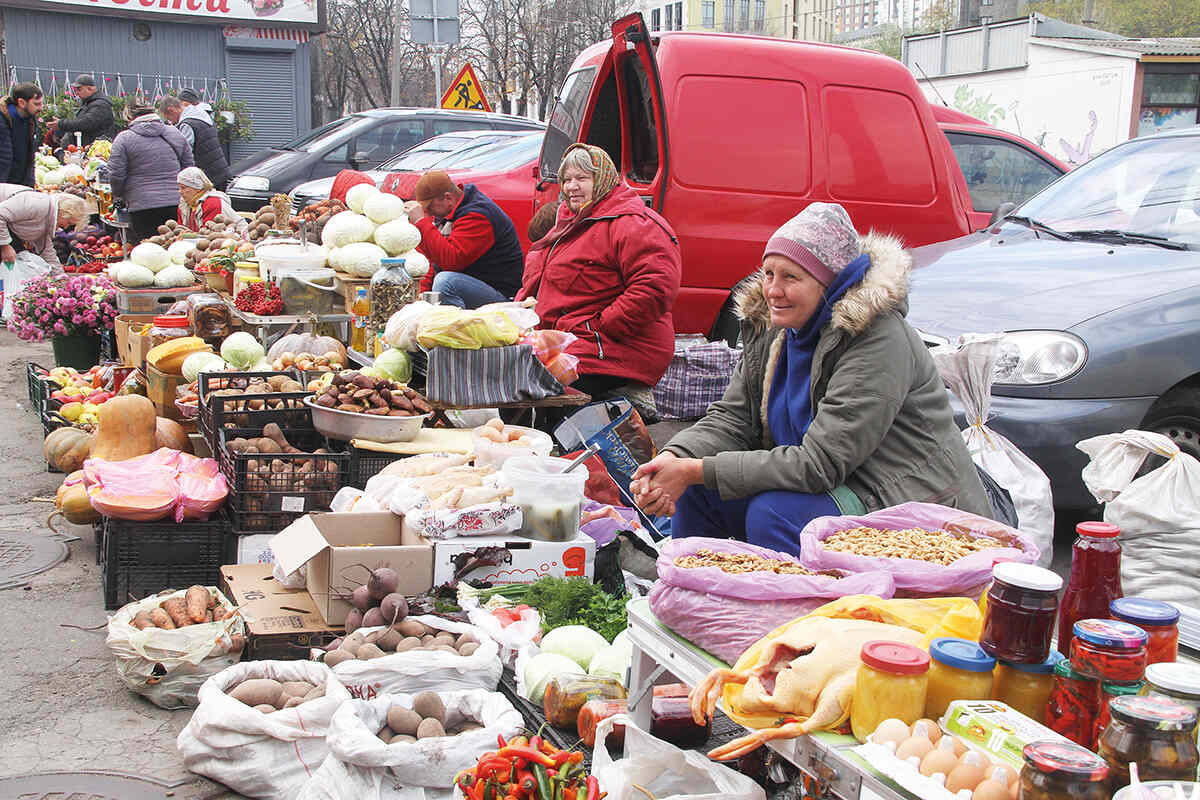
‘In Kaniv, there was no sign of the war,’ said Aliowna. ‘It’s a small place on the Dnipro [River], two hours from Kyiv. My hometown. We were lucky. We know it. There was an apartment we could use belonging to my parents. As for jobs, my CEO sent a message saying we would stop work until Monday. The war had started on Thursday. Then what? No-one knew. A friend in Kyiv telephoned and asked if I thought she should go to work. I had childhood friends who’d also returned to Kaniv. It was a peculiar reunion. Some people even went to yoga and pilates. It was almost as though they didn’t want to believe in the war.’
‘We stayed for six months,’ said Andrei. ‘I found a company that could still install internet in the apartment. For us, it meant we could work remotely. We are very aware not everyone could. Work allowed us to switch focus, to stop our brains being paralysed. We had summer by the river, visiting Kyiv for weekends and bringing things from our apartment.’
I asked what it was that made them return permanently. ‘One time, driving our car into Kyiv, I felt happiness,’ said Andrei. ‘I understood that war continues, but this city gives me energy. I said to Aliowna that we should return. Now, we spend the week with Aliowna’s parents on the outskirts of Kyiv. They have fibre internet which doesn’t need electricity. It’s easier for work. At weekends we go home.’
I asked how it was living with parents. ‘Sometimes we have discussions,’ said Andrei. ‘We are a new generation. We are proud of our president. They don’t think like that.’
‘My parents are not against Zelenskyy,’ said Aliowna. ‘They’re just not for anyone. They think politicians will never make a difference.’ We paid the bill and left, passing a former London double-decker bus fashioned into a street café, replete with photographs capturing Volodymyr Zelenskyy shaking hands with Boris Johnson.
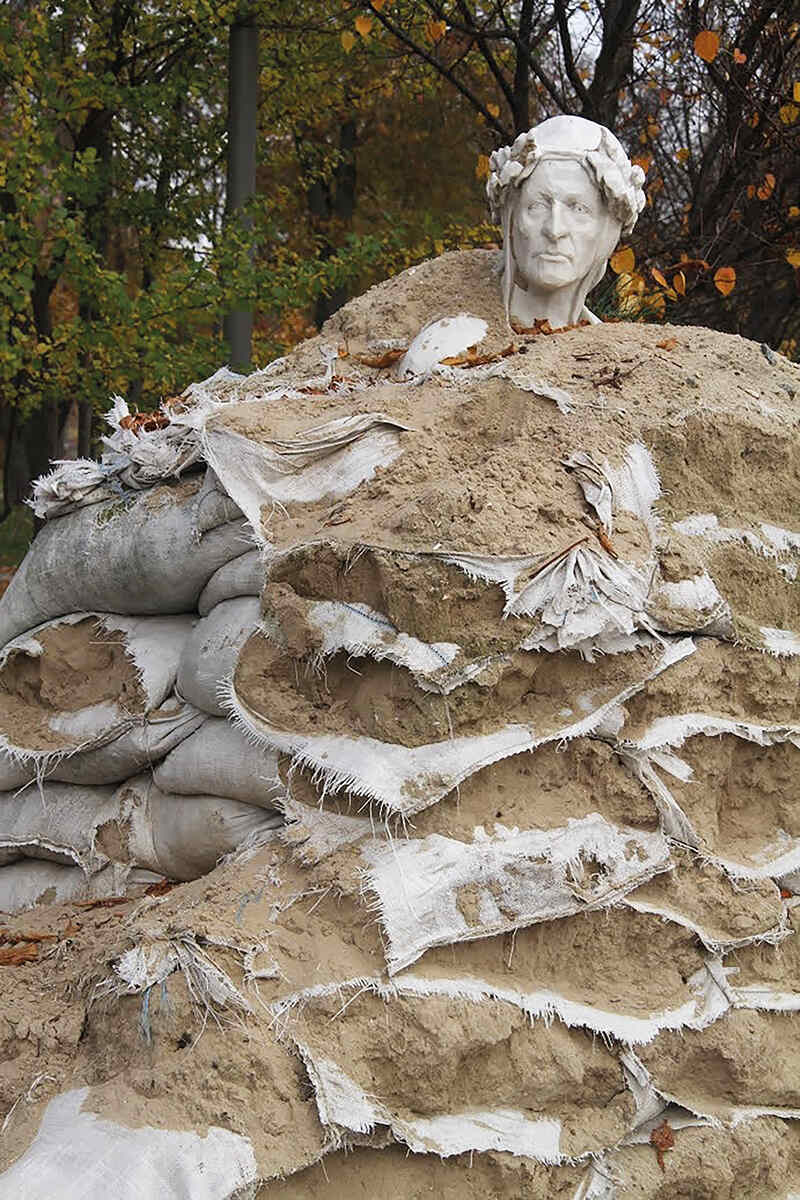
Kyiv’s neighbourhood of Podil is an area of restaurants and hipster cafes. Here, I’d arranged to meet Vlada at Kontraktova Square, close by the university where she worked. Once we’d found a quiet place to talk, I asked whether the war had been a surprise. ‘For me and some others, for years, we knew there would be conflict,’ she said. ‘When it finally happened there was a relief. We started working with this war. It was a job we had to do. It was quite noisy initially. There were tanks, a lot of fighting around Kyiv, constant shelling. But I decided to stay. I have my apartment, my own little space, and I have my students. If I lose those, I’m not sure I will survive.’ In the canteen-style café, most of the tables were occupied by students. ‘Some cohorts have left to continue studies abroad. Some 150 to Toronto, another 150 to Glasgow, but others are not at university, they are in the army. This is the reality.’
I asked Vlada about life in the city. ‘For me, after the northern region was liberated in April, there was a certain normality,’ she said. ‘The city was still empty. It was the best time for bikes. Normally the traffic is scary. I had the whole road to myself. Cultural life in Kyiv came back; there was a lot of music, a lot of art. The war has been socially transformative. Not many speak of this, but it has. It’s almost a perfect life, except for occasional missiles, and except for understanding that people are dying.’
Tentatively, I asked whether she’d been affected directly. ‘Some days I am afraid to open my Facebook. Friends post that their friends have been killed; my own friends, too, have died,’ she replied. ‘One day – I’ll never forget those funerals – three killed on the same day, one a boy not even 20 years old.’

We talked about the personal stresses of the war. The previous day there’d been a significant cruise missile attack on Kyiv. I’d heard and felt the explosions. ‘I didn’t see the missiles, but I heard one pass overhead,’ said Vlada. ‘I’ve seen the results of a missile strike on an apartment. Part of me is in denial. Another part knows that perhaps I’m already dead. You do what you can. We hug a lot. There are hugs everywhere.’
As we walked back through Podil, second-guessing youths riding electric scooters, Vlada summed up her situation. ‘I have a job and an apartment,’ she said. ‘My relatives are safe. I have a lot of friends. I’m single and I don’t have children, just me and my cat. I’m fortunate. Outside the war, I’d maybe define myself differently. I don’t know how it will end. Hopefully, with a free and independent Ukraine, and a huge wall between us and Russia.’
While in Kyiv, I rented an apartment. Sergei was my landlord. He sold property and short-term lets across the capital. We drank coffee after he turned up to see how I was settling in. He was 37 years old, had a wife and an eight-year-old child. ‘Russians came to Brovary, my hometown to the east of Kyiv,’ he said. ‘My parents didn’t want to move. We had our own well and wood for the fire. They thought it would be better than the city. Then through the window, I saw Russians in the next village. They destroyed houses with tanks for no reason. There were very terrible noises, explosions. It was time to leave.’
We talked about the economic impact of the war. ‘Around 50 per cent of my clients were Russian,’ said Sergei. ‘We had no work until mid-May. By then, some soldiers needed a rest. People who lived in Kyiv, they wanted a release. And we had some journalists. By the summer it was more or less okay. We were 90 per cent full. Obviously, just Ukrainians. But in October, it became worse again. For three weeks Russians tried to destroy our power infrastructure. They failed.’
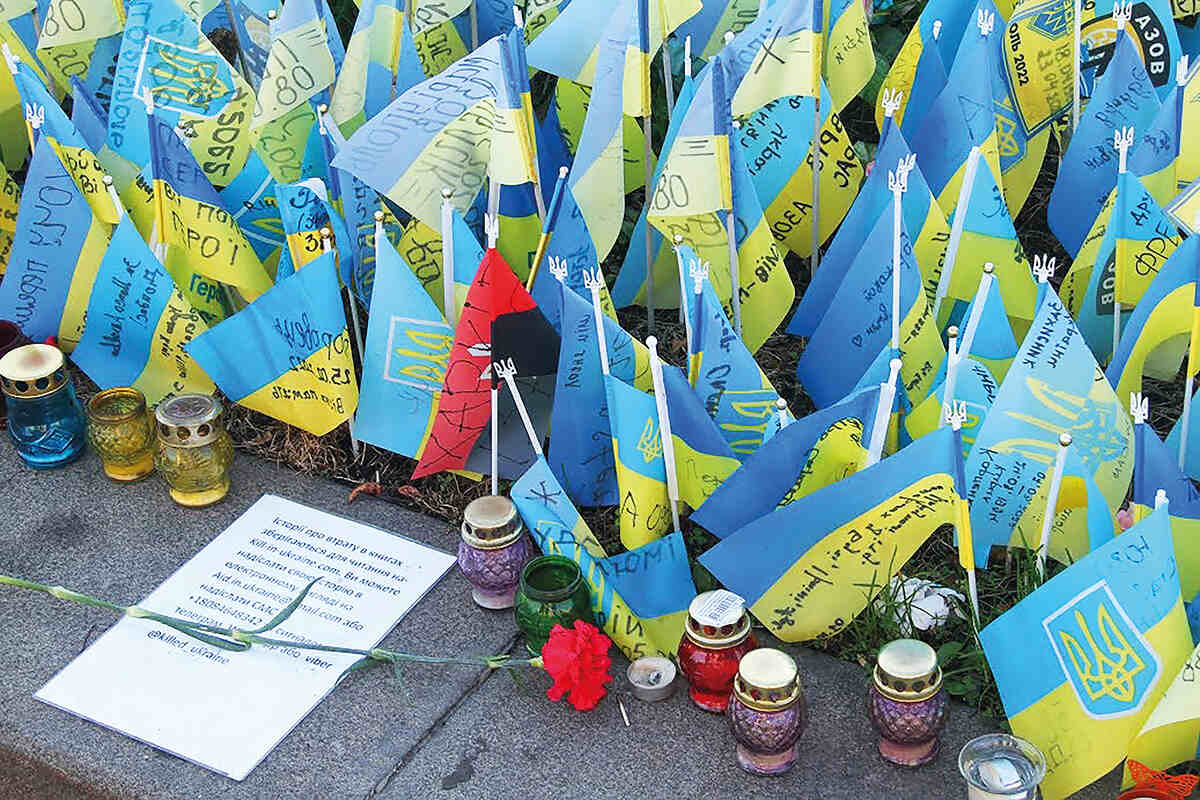
I had experienced that period myself as I was reporting from Kyiv at the time. Monday mornings became synonymous with missile attacks. On Sunday evenings, everything was plugged in to charge up, and any spare bottles were filled with water. It became automatic. ‘Now, old apartments, seven to nine floors, there is water and heating, and often they have gas,’ said Sergei. ‘Newer, higher apartments, many use just electricity, they have pumps for water, and elevators. These don’t work.’
I’d seen how the provision of power differed across the capital and from city to city. ‘In my neighbourhood, we have three to four hours of electricity each day. In 1991, there was a big economic crisis, also many power cuts. We used kerosene lamps and candles. We survived like the 19th century. At first, it was the same situation. But now Ukrainians order batteries and inverters from AliExpress. Three weeks and it arrives,’ Sergei recounted triumphantly.
I asked about the future. ‘In my business, our prices are down and there are fewer people, but we’re still working, still living… I’m optimistic,’ he said. ‘I hope Western powers will continue to support us. We don’t want any part of Russian land. We just want them to leave.’
Daily life in Ukraine can encompass both the prosaic and the surreal. Travelling to Odesa, my journey started in the late evening when I ordered an Uber to Kyiv-Pasazhyrskyi station. I’d already booked a bunk on the ten-hour sleeper service via Ukrzaliznytsia’s website. At the station, bags were x-rayed on entry. The cathedral-like booking hall had more electric light than in November 2022, when passengers had waited in darkness. A small Spar supermarket was open, along with a coffee bar and sandwich shop. The escalators were running and in the background, Stefania, Ukraine’s winning Eurovision entry, played on the station PA. Electronic displays showed arrivals and departures across Ukrzaliznytsia’s 24,000 kilometres of tracks. I bought a cappuccino and waited for a platform number. Instead, air raid sirens wound up to sound the alert. Station staff ushered everyone outside, down into the metro station. Forty minutes later, the all-clear was given. By then, my train was waiting. We departed on time and the next morning, a promised black coffee was served by the carriage attendant.
On arrival, Odesa’s fantasy of Art Nouveau architecture was chilled by stinging showers of snow whipped up from across the Black Sea. Thanks to missile and drone strikes, my accommodation had no electricity, water or internet and little natural light. Thankfully, it was warm. In the centre of town, beyond the opera house, the boarded statues of Odesa City Garden and past the dormant grandeur of the Velyka Moskovs’ka Hotel, generators rattled loudly on icy streets.

Max was 21. He worked front-of-house in an Odesa bistro. ‘In May 2022, for a while we went to the countryside. There were too many airstrikes. During that time, many people lost their businesses, their homes,’ said Max. ‘In Odesa, all the streets were blocked. Security checks were everywhere. Fifty per cent we thought the Russians will come to Odesa too.
Many went abroad, but for my girlfriend and me, our roots are here, our flat is here, our life is here. I wanted to stay and support the economy, spend at local shops. It keeps everyone working.’
I asked about the new mobilisation. ‘Some want to fight, some don’t, but there is no choice,’ he said. ‘It’s difficult. My mother is worried. I am her only child. The recruiting officer on my street, a small street, has a quota of 500 people. He gives you the paper, that’s it. We have a Telegram channel. It tells when they are around. We try to avoid them. Some are afraid, afraid of dying. Some, it would just mess up their lives.’
I mentioned that in Russia, many had left the country to avoid the draft. ‘I wouldn’t do it,’ said Max. ‘But in the past, people have paid money, big money, 5,000 dollars to go to Moldova or Poland. Now that’s harder and if you’re caught you are arrested, your family is arrested. It’s a big problem.’
Max had already pointed to a socket where I could charge my phone. I asked how he’d adapted to the lack of power at home. ‘We do things in the early morning when there is electricity,’ he said. ‘We use the washing machine, very quickly. Everything is very quickly. We have gas for cooking. We’re lucky. Generators are everywhere, but it’s not possible in flats. We would kill ourselves with fumes. We have a big car battery and LED lights. Like this, it goes a bit better.’

Back in Kyiv, I took another ten-hour train journey east to Kherson. Liberated by the Ukrainian military in November 2022, shortly after the occupiers had declared the city ‘forever’ part of Russia. The recapture of Kherson marked the high point of Ukraine’s counter-offensive. Images of celebrating crowds waving blue and yellow Ukrainian flags buoyed the nation.
In February, walking 40 minutes from the station to the centre of town, the streets were nearly deserted. Shops and businesses were closed. Windows were boarded up, blown out or both. Splinters of glass crunched underfoot. Lost dogs wandered across the road. The near silence of cold morning air was broken by Russian artillery. Every few minutes, explosions reverberated through the city. The intensity never reached that of a barrage, but it was constant.
In one of few open shops I talked to Katerina. She had lived across the Dnipro in a town now occupied by Russia. ‘I used to work for the local radio station,’ she said. ‘In February, quite many of the town, about 40 per cent, were happy. They didn’t ask for Russia but when the invasion came, they were happy. They don’t know why. They watch too much Russian television.’
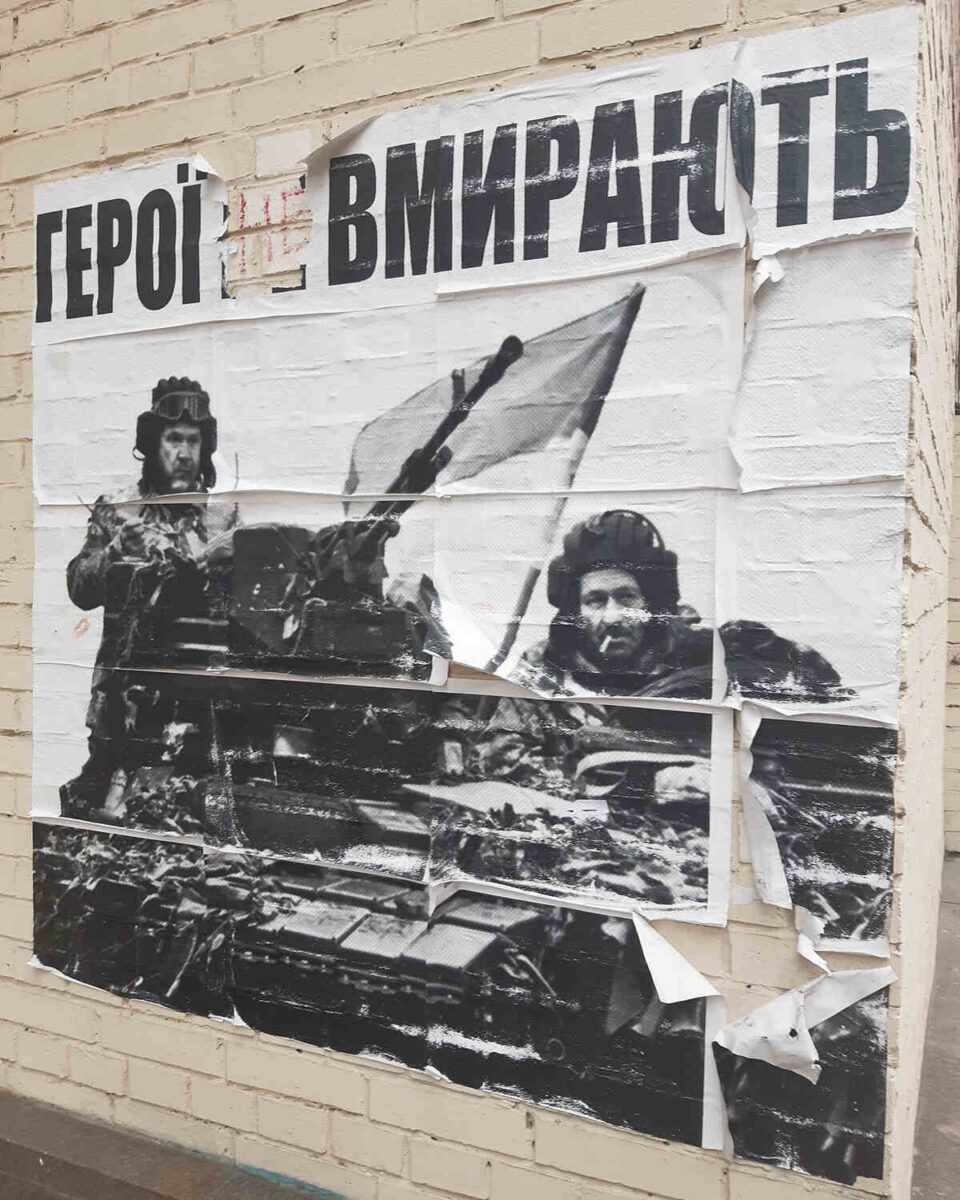
I asked how she had managed to leave. ‘It was dangerous because I was on the wrong side of the Dnipro, but by taking some small roads it was possible,’ she replied. ‘At first, I went to Poland, but you know, it’s not Ukraine, so now I moved to Lviv. I’m here in Kherson for just one night. There’s nothing. Everything is closed. Most young people have left. The old ones, they stay. Some have nowhere to go.’
Katerina was still in contact with relatives behind Russian lines. ‘They say it’s normal life, but prices in shops are high and everything is coming from Russia so it’s not good quality,’ she said. ‘My uncle stayed. His son is in the Ukraine army. My uncle waits for him.’ I asked if she would ever return. ‘It will be very difficult to see those who wanted Russia.’
Before leaving Kyiv for Poland, in the late evening, I spoke to Andrei via WhatsApp. The screen showed him and Aliowna sitting in a room illuminated by candles. ‘We are paying a high price for the future,’ he said. ‘In the end it’s all about blood. A new mobilisation is going on. If this is a long war so the “opportunity” to reach the frontline increases.’ As usual, he seemed embarrassed by the normality of their lives. He gave thanks to the country’s armed forces and condensed the feelings of many ordinary Ukrainians. ‘I don’t have the right to tell anyone about the war,’ he declared. ‘My experience is the news. That’s not real war. Our life is not so epic, it’s small. It’s the events that are big.’
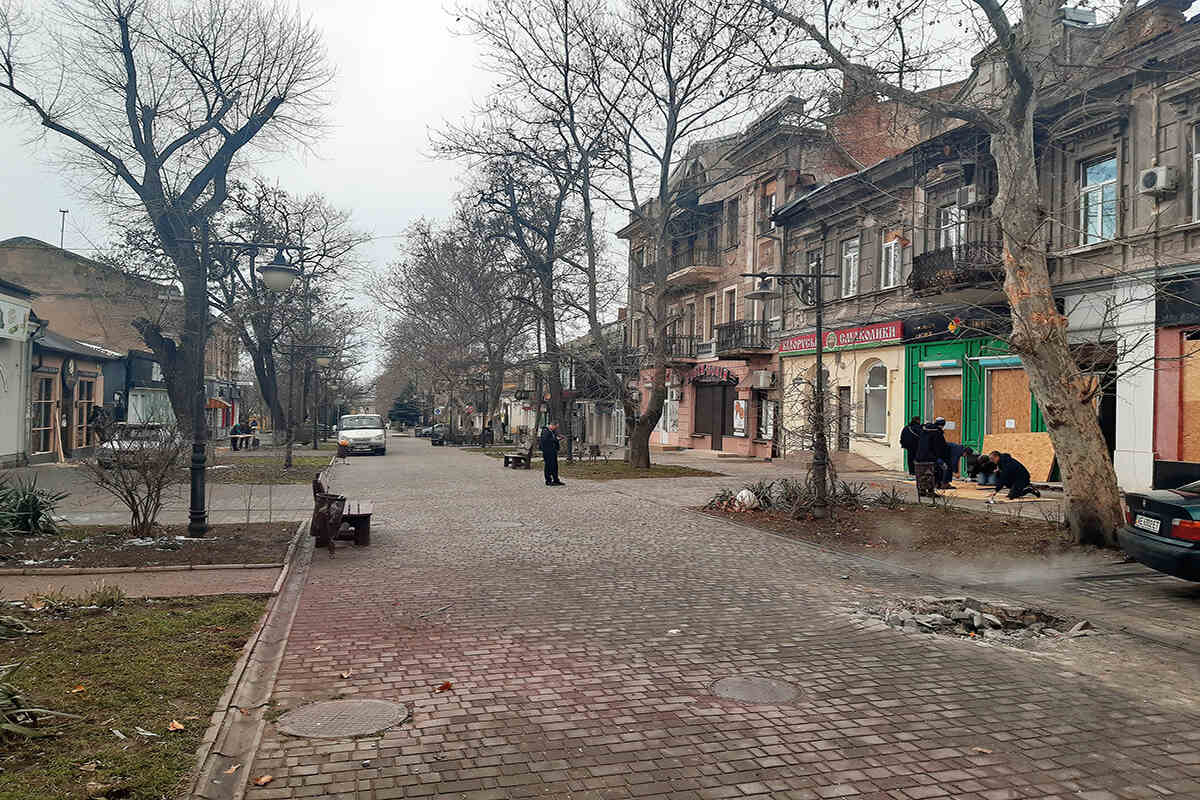
Life in Kyiv is a calculated risk. Russian missile and drone attacks intensified towards the end of 2022. Electrical and thermal power plants were targeted. After reverses on the battlefield, Russian tactics evolved to ally with harsh winter temperatures in a campaign to sap the will of Ukrainian defenders. However, effective air defences and an unusually mild winter blunted the attacks. While many left Kyiv after the February invasion, many have now returned and have been joined by those displaced from elsewhere in Ukraine. Although there are inconveniences and discomforts, the city functions. People have surprised themselves with their own adaptability.
‘We are living under emotional pressure. My situation is easier. I don’t have Russian relatives. The last Russian I spoke to was a tourist who came to Kyiv during the 2014 Revolution of Dignity. Since then, no-one,’ stated Vlada emphatically. ‘There are people with insomnia, with psychological problems, but they say it out loud. It’s a good thing.’




